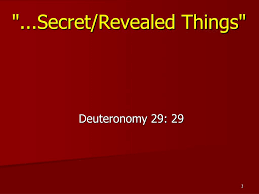The choices we make
I’m sure you have heard the story about the man who faced imminent danger as a result of a flood that begun to ravage his community. The flood waters became higher, forcing him to retreat to the roof of his house. On two occasions, individuals in boats beckoned him to climb into their boats and save his life. But he refused and shouted back from his roof, “I’m a Christian! God will save me!”
Finally, the waters rose to the edge of the roof. Suddenly a helicopter appeared and begged the man to grab the dropped latter and be saved. Well, you know what happened! The man refused and ultimately died. When he entered heaven, he demanded to see God. “Why did you let me drown?” Instead of striking him down with a lightening bolt, God calmly replied, “Hey, I sent you two boats and a helicopter.”
As we face the challenges and problems in our life, we often fail to watch and follow the leads that God sends us. Many of these are given to us before we enter our trial. However, when we’re in that dire situation, so is God! God is there AND He wants us to use the resources He has provided for us. Such was the case with Moses as he faced his first hurdle upon leaving Egypt for the Promise Land (Exodus 14).
After Moses and the Israelites left Egypt, Pharoah had “seller remorse”. God hardened his heart and caused him to regret letting the Israelite slaves leave (S). He probably felt like he had been duped. Who would do the work that the Israelites did? Egypt’s economy would probably suffer, not to mention their quality of life—who would cook, clean, and serve them? So much for Pharoah right now, let’s return to Moses’ dilemma.
The dilemma
As Pharoah and his army approached, the Israelites looked up, and there were the Egyptians, marching after them. They were terrified and cried out to the Lord. They said to Moses, “Weren’t there enough graves in Egypt that you brought us out here to the desert to die? What have you done to us by bringing us out of Egypt?”
The complaints escalated. Moses tried to reassure the Israelites that everything would be alright. He tried to coach them to “stand firm” and “be still”. God would fight for them! (Exod. 14:13-14). Moses told them that they would see the salvation of the LORD on that day. But all they could see were Egyptians bringing up the rear fast. They could not see God!
As I read this passage, I saw myself when facing hard times and challenges. I tend to see only what I can look at with my physical eyes—loss of health, injustice, change in relationships, economic uncertainty.
It’s even harder for me to “be still”. I need to fix this situation and now. I see only me standing before the Red Sea. But all is not loss—I’ll tell you why in a few. Back to Moses.
“Any old help will do.”
I’m sure Moses cried to God. Exactly what he said is not included in the scripture text. But the Lord used this moment to speak directly to Moses. Was God going to tell him that help was on the way? Was He sending two boats and a helicopter?
The Lord said to Moses, “Why do you cry to Me? Tell the children of Israel to go forward” (Exod. 14:15).
Moses probably thought, “Really? Red Sea before me and Egyptians behind me.” Sometimes when we pray, God’s answers don’t always make sense to us at first. But that’s where our faith in God—His greatness and His goodness—reinforces the need to obey His instructions (Heb. 11:1).
God gave Moses an answer he didn’t expect: “Raise your staff and stretch out your hand over the sea to divide the water so that the Israelites can go through the sea on dry ground.” (Exod. 14:16)
Moses had the answer to His dilemma “right in his hand” PLUS the power of God. Moses and his staff would be the conduit God would use to not only deliver the Israelites but also glorify God. This act of deliverance would spread throughout the countryside including to the potential tribes in the Promise Land whom the Israelites would need to conquer (Exod. 14:18).
When you need help…
From this study, I came to the following conclusions about what to do when I need help.
-
- Assess what I currently have available to address my problem. I will not only inventory what I have with my “physical eyes” (my mind and my intellect) but also with my “spiritual eyes”. When I read God’s Word, especially His promises and follow that with prayer, I can expect God to show me what to do. I have learned that God’s ways, methods, and timing are not the same as mine (Is. 55:8-9). THEY ARE BETTER!
-
- “Lift up to God” the resources He has already provided for my solution. Moses failed to remember that God had told him that He would go with him on the journey to the Promised Land. He had forgotten how God used Moses’ staff in the court of Pharoah (Exod. 4:3). Sometimes I refuse to move forward until I have “all the information and answers”. When that happens, it is important for me to call to remembrance (Is. 46:9,10) where God has stepped in to join me in my battles (2 Chron. 20:6-7, 12).
-
- Move forward. I am still learning each day to move forward when directed by God. I guess it’s part of being human. I am learning to move “more quickly” when God directs me and learning to trust Him more.
In my moments of prayer and meditation, I ask God to show me those areas of my life where I sin by being prideful or self-reliant. He uses that time together to gently redirect my attention away from my problems and look to Him. God is greater than any problem we may face and better equipped to solve them. Only God can guarantee our success!
When God created us, He not only placed His purpose within us but also placed the ability to complete that purpose (Phil. 1:6). As God prepares our path, He also prepares us for the path. It is our responsibility to believe, to trust, and then obey.
Conclusion
The next time you need help, deliverance, or an answer for life’s challenges, don’t always look for a miracle from God. He doesn’t need to come to our rescue. God is always with us. We daily live not in God’s miracles but by His lovingkindness and grace. He is there to help us see the resources He has already provided for our escape (Eph. 1:17-20).
Prayer: O Heavenly Father, grow within us the faith we need for the challenges we face. Train us to look at our problems as opportunities to partner with You in their resolution. Forgive us when we lean on our own understanding. Place in our heart an expectation that You are with us and will always act on our behalf. Lord, finally, help us to “Go forward” in Your name and by Your power. Amen










